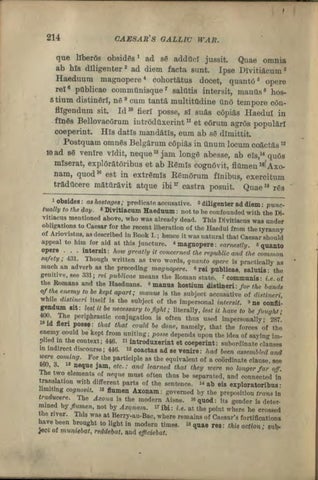214
CAESAR'S
GALLIC
WAR.
que liberos obsidss 1 ad sll adduct jussit. Quae omnia ab his diligenter 2 ad diem facta sunt. Ipse Drvitiacum 3 Haeduum magnopere 4 cohortatus docet, quanto 5 opere reI6 publicae communisque 1 salutis intersit, manus 8 hosIl tium distinsrr, ne 9 cum tanta multitndins uno tempore conflrgendum sit. Id 10 fieri posse, si suas ccpias Haedut in -fInes Bellovaeorum iutrodnxerint net eorum agros populart coeperint. His datis mandatrs, eum ab sl! dtmittit. Postquam omnes Belgarum copias in unum locum eoactas 12 10 ad se venIre vrdit, neque 13 jam Ionge abesse, ab eis,14quos mIserat, exploratoribus et ab Remis cognovit, flumen IfAxonam, quod 16 est in extremis Remorum ftnibus, exercitum traducere maturavit atque ibi 11 castra posuit. Quae 18 res 1 obsides: as hostaoes ; predicate accusative. 2 diligenter ad diem: punctually to the day. 8 Divitiacum Haeduum: not to be confounded with the Di-
vitiacus mentioned above, who was already dead. This Divitiacus was under obligations to Caesar for the recent liberatiou of the Haedui from the tyranny of Ariovistus, as described in Book I.; hence it was natural that Caesar should appeal to him for aid at this juncture, 4 magnopere: earnes/ly. 5 quanto opere . . . intersit: how greatly it concerned the republic and the common safety; 431. Though writteu as two words, quanto opere is practically as much an adverb as the preceding magnopere. 6 rei publicae, salutis: the genitive, see 331; rei publicae means the Roman state. 7 communis: i.e. of the Romans and the Haeduans. s manus hostium distlneri: for the banda of the enemy to be kept apart; manus is the subject accusative of distineri, while tiistineri itself is the subject of the impersonal intersit, 9 ne con1ligendum sit: lest it be necessary tofight; literally, lest it have to be fought; 400. The periphrastic conjugation is often thus used impersonally; 287. 10 id fieri POSSll: that that could be done, namely, that the forces of the enemy could be kept from uniting; posse depends upon the idea of saying implled in the context; 446. 11 introduxerint et coeperint: subordinate clauses in Indirect discourse; 446. 12 coactas ad se venire: had been assembled and were coming. For the participle as the equivalent of a coordinate clause, see 460, 3. 18 neque jam, etc... and learned that they were no longer far Off. The two elements of neqlle must often thus be separated, and connected In translation with different parts of the sentence. 14 ab elB exploratoribus: limiting cognovit. 16 fiumen Axonam: governed by the preposition trans In traducere. The A:l:ona is the modern Aisne. 16 quod: its gender Is deter. mined by fiumen; not by A:l:onam. 17 ibi: i.e. at the point where he crossed the river. This was at Berry路au-Bac, where remains of Caesar's fortifications have been brought to light in modern times. 18 quae reo: actfon; Sq1). ;Jec~ of lIluniebqt, redde/)at, and efficiebat.
t"~
